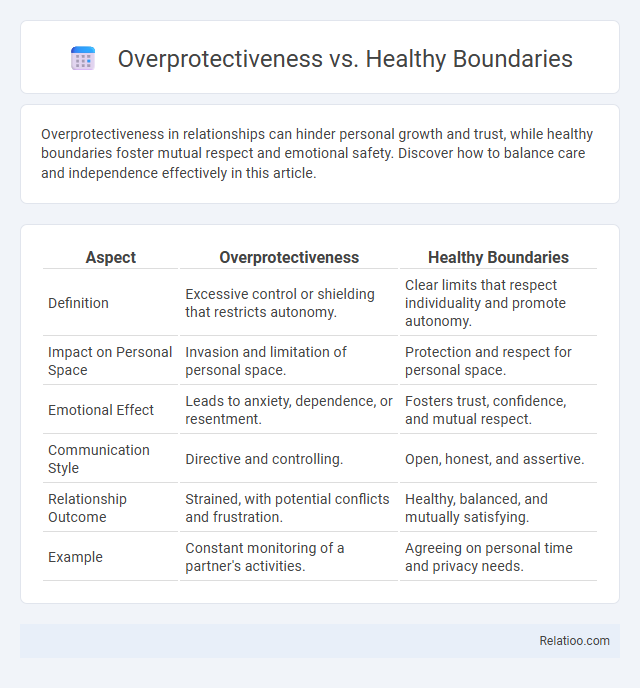Overprotectiveness in relationships can hinder personal growth and trust, while healthy boundaries foster mutual respect and emotional safety. Discover how to balance care and independence effectively in this article.
Table of Comparison
| Aspect | Overprotectiveness | Healthy Boundaries |
|---|---|---|
| Definition | Excessive control or shielding that restricts autonomy. | Clear limits that respect individuality and promote autonomy. |
| Impact on Personal Space | Invasion and limitation of personal space. | Protection and respect for personal space. |
| Emotional Effect | Leads to anxiety, dependence, or resentment. | Fosters trust, confidence, and mutual respect. |
| Communication Style | Directive and controlling. | Open, honest, and assertive. |
| Relationship Outcome | Strained, with potential conflicts and frustration. | Healthy, balanced, and mutually satisfying. |
| Example | Constant monitoring of a partner's activities. | Agreeing on personal time and privacy needs. |
Understanding Overprotectiveness and Healthy Boundaries
Understanding overprotectiveness involves recognizing behaviors that excessively limit autonomy and create dependency, often resulting in stress and hindered personal growth. Healthy boundaries establish clear, respectful limits that protect your emotional and physical well-being while promoting independence and trust. Balancing these aspects ensures supportive relationships without sacrificing individuality or self-confidence.
Key Differences Between Overprotectiveness and Boundaries
Overprotectiveness involves excessive control and restriction that can hinder personal growth, while healthy boundaries establish clear limits that respect autonomy and promote mutual respect. Boundaries empower you to maintain individuality and emotional well-being without isolating or sheltering from real-world experiences. Understanding the key difference is essential: overprotectiveness limits freedom through fear, whereas boundaries create safe spaces through intentional respect.
Signs of Overprotectiveness in Relationships
Signs of overprotectiveness in relationships include excessive monitoring of your partner's activities, frequent checking in or demanding constant updates, and disregarding their need for personal space. It often manifests through controlling behaviors, such as limiting your partner's social interactions or making decisions on their behalf without consent. Maintaining healthy boundaries requires mutual respect and trust, balancing care with independence to prevent emotional suffocation.
Benefits of Establishing Healthy Boundaries
Establishing healthy boundaries fosters respect and clarity in relationships, promoting emotional well-being while preventing the negative effects of overprotectiveness. Your ability to set clear limits enhances personal autonomy and reduces stress by balancing care with independence. This approach ensures support without smothering, enabling growth and trust in both personal and professional interactions.
The Impact of Overprotectiveness on Personal Growth
Overprotectiveness can hinder your personal growth by limiting opportunities to develop autonomy and problem-solving skills. Establishing healthy boundaries fosters independence and emotional resilience, promoting a balanced environment for self-discovery. Removing overprotective barriers allows individuals to face challenges, build confidence, and achieve meaningful growth.
Why Healthy Boundaries Foster Trust and Independence
Healthy boundaries establish clear expectations that promote mutual respect and understanding, fostering trust in relationships by allowing individuals to feel secure without feeling controlled. Unlike overprotectiveness, which can lead to dependency and resentment, healthy boundaries encourage autonomy and personal growth, supporting independence. The balance between protecting and empowering nurtures resilience and confidence, essential for strong, trusting connections.
Overcoming the Urge to Overprotect Loved Ones
Overcoming the urge to overprotect loved ones involves recognizing the difference between healthy boundaries and excessive control that stifles independence. Establishing trust and open communication fosters emotional security while allowing personal growth and resilience. Prioritizing empathy and respect for autonomy helps maintain balanced relationships that support both safety and self-confidence.
Strategies for Setting and Maintaining Healthy Boundaries
Setting and maintaining healthy boundaries involves clear communication of your limits and consistent enforcement to protect your well-being. You can use assertive communication techniques to express your needs without guilt, fostering mutual respect in relationships. Regularly reassessing and adjusting boundaries ensures they remain effective against overprotectiveness and support emotional balance.
Communicating Boundaries Effectively with Others
Communicating boundaries effectively with others requires clarity, consistency, and respect, helping you distinguish between healthy limits and overprotectiveness. Establishing clear, assertive communication prevents confusion and fosters mutual understanding, promoting trust and emotional safety in relationships. Balancing openness with firmness ensures your boundaries are honored without overwhelming or alienating those around you.
Balancing Care and Freedom in Healthy Relationships
Balancing care and freedom in healthy relationships requires distinguishing between overprotectiveness and setting healthy boundaries, where overprotectiveness often limits autonomy and trust, while boundaries promote mutual respect and personal growth. You can foster emotional security by encouraging independence and open communication, ensuring both partners feel valued without feeling controlled. Prioritizing healthy boundaries enhances relationship quality by allowing care to coexist with individual freedom.

Infographic: Overprotectiveness vs Healthy Boundaries
 relatioo.com
relatioo.com